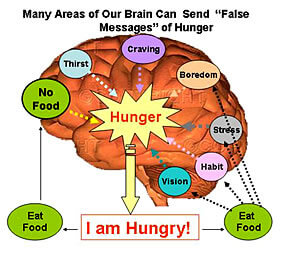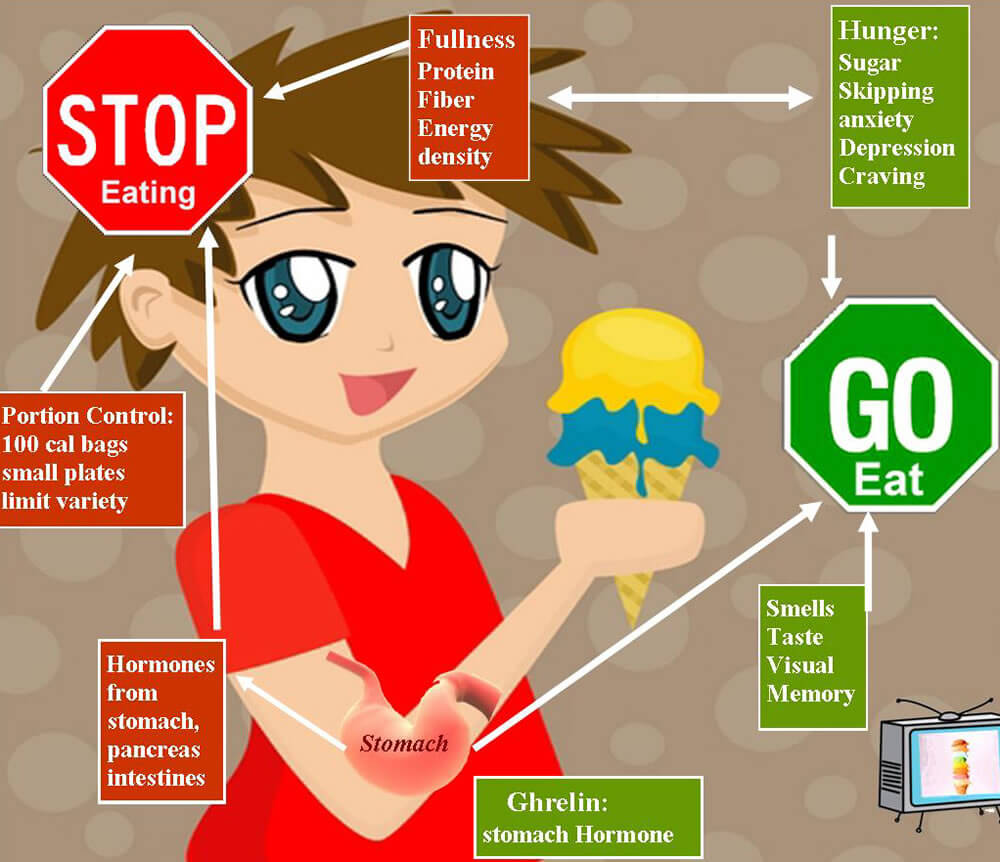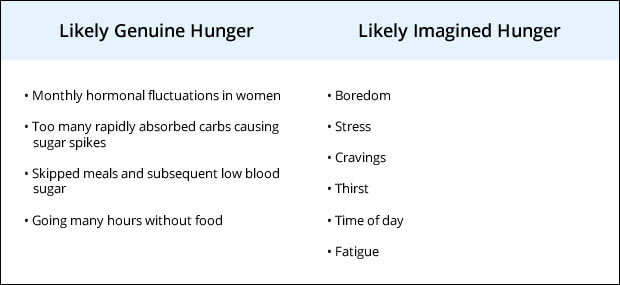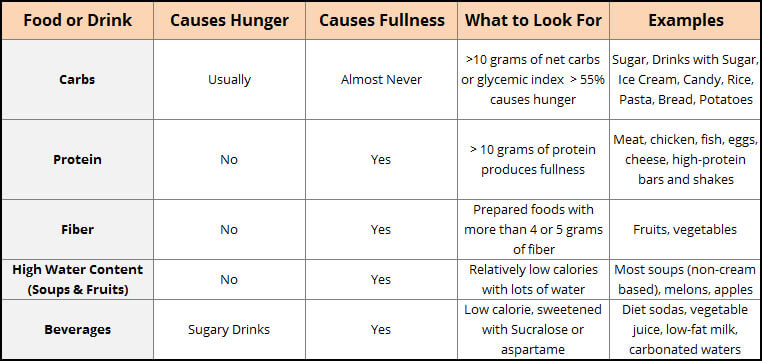HCG drops reduce hunger and cravings, but hunger can still occur.
What can you do about it?
As in any weight loss plan, HUNGER is the most common barrier to success. HCG dieters will eventually stop the diet just to make these feelings go away. People very commonly aren’t able to properly distinguish between real hunger and cravings or other emotional feelings. Identifying and preventing real and perceived hunger leads to easy weight loss.
Check Sheet for Hunger in the HCG Diet: What to Do
- Is the feeling actual hunger, or is it thirst, anxiety, boredom, stress, habits and many other feelings masquerading as hunger? If you suspect this read below.
- Are cravings being mistaken for hunger? Cravings are an irrational need for certain foods and can occur right after eating.
- Are you eating foods that produce hunger such as sugar or foods quickly turning to sugar. The net carbs should be less than 10 grams and the sugar less than 2 or 3 grams.
- Are you skipping meals or eating meals without enough protein? In general it takes 10-15 grams or more of protein to feel full.
What to Eat If You are Actually Hungry?
- Food Shifting: First consider the timing of your meals. There is no truth to the myth that eating late in the evening has any effect on weight gain or loss. If you are hungry at night then simply shift some of the food to later in the day. Many people with hunger in the evening do well by eating dinner later in the evening and going to bed earlier. The idea is to decrease those dangerous hours between 8 PM and midnight. Be careful, sometimes this kind of eating is due to anxiety or boredom. Get some good snacks if this is the problem. Individuals who make it a habit to stay up very late, often alone, can do all kinds of damage late in the evening.
- Add Some “Safe” Foods and Drinks: For unknown reasons, some individuals have days and sometimes weeks of unexplained hunger. This can sabotage any attempt at weight loss. In the end, you will need to find some “safe” foods and drinks. Here is what you can eat or drink to decrease hunger:
- Eat a lot of the “right” snacks. Low-carb & calorie, portion-controlled snacks can avert hunger by preventing the sharp spikes and falls in the hunger triggers – endorphins and blood sugar levels. Eating snacks tells our brain that we are not starving ourselves to death; this in turn lets the body burn more calories. Skipping meals, especially during the day, tells the body to hold on to its source of energy and stop burning fat and calories. Sugar free jello, fruits, vegetables and soups add bulk.
- Eat protein-rich foods. Eating foods rich in protein stabilizes blood sugar for hours and produces feelings of fullness. This is especially important with breakfast, where avoiding protein is easy. Get into the habit of reading food labels for the number of grams of protein and fiber in that food. Satisfying foods have more than 10 grams of protein per serving and extremely filling foods have more than 20 grams of protein per serving. Add some eggs or low calorie and low fat clams, oysters, crab and scallops
- Focus on fiber-rich foods. Eating foods with high fiber content can produce feelings of fullness for hours. There are two kinds of fiber in our diet, depending upon how they dissolve in the stomach. Insoluble fibers do not dissolve and pass thru the body undigested. These include wheat and corn bran, whole grain cereals, nuts and seeds and the skins of some fruits and vegetables. The other type of fiber dissolves in the stomach, such as fiber in fruits, vegetables, oat bran and barley. The more fiber the better. Seek 25 grams or more of total fiber per day and 10 grams or more fiber per portion. Vegetables are unlimited in the HCG diet plan.
- Add foods with a lot of water. Foods with high water content are very heavy and produce fullness for hours. Examples of such foods are soups (not cream-based), many fruits and vegetables with high water content, stews and cooked grains. Eating these types of foods, especially before the main meal, can result in consuming fewer calories during the subsequent meal.
- Drinking the “right” beverages may help prevent feelings of hunger. Water, diet sodas, low-fat milk and vegetable juices can often be very useful for losing weight. These beverages create a sense of fullness. Some beverages help to maintain blood sugar levels, and diet sodas sweetened with Sucralose can also eliminate your cravings.
More About Causes of Hunger in the HCG Diet:
Why are 100 million overweight Americans having such difficulty losing weight? The answer is that we are always hungry (or at least we think we are). The search for food is one of our strongest drives; it is deeply ingrained in us and is necessary for our survival. But we have reached a stage of development in our societies where we are constantly exposed to high-calorie, easily obtainable, pleasing and inexpensive food. All of this food overwhelms our control mechanisms and we just cannot stop eating.
Hunger is a normal reaction to the absence of food in our system; it is our body’s way of signaling to us that we need to eat. People who have succeed in their weight loss programs understand that it’s possible to control feelings of hunger by understanding the factors that stimulate it. Hunger management is as important to losing and keeping off weight as pain management is to modern surgery.
In order to successfully manage hunger we must first learn to recognize the difference between hunger and cravings. The “growling” of our stomach, often accompanied by fatigue, weakness and thoughts of food, is hunger. Cravings are simply a very powerful, irrational need for specific types of foods. Cravings occur even when we are not hungry or after we have just finished a large meal. Hunger is a necessary physical need while cravings are emotional desires.
Three distinct factors create the feeling of hunger:
- Internal chemicals in the brain and blood
- Type of foods we eat or do not eat
- External cues and stimuli to eat
HCG Reduces Hunger from Internal Chemicals That Tell Us to Eat
Many obese individuals are unable to lose weight because of hormonal imbalances in their brains and blood. They never feel full because they either lack certain hormones or have too much of them. Often the brain’s appetite center fails to recognize the signals for how often we eat and how much we eat the way it should. These are some of the reasons that certain very overweight people cannot lose weight and disproves the statement that willpower must play a role in dieting.
The master hormone in charge of our eating is Leptin (from the Greek word leptos, meaning thin), which is produced by fat cells. Leptin tells our brain how much fat we have stored in our body. When our brain senses that there is too little Leptin, it will react with hunger and signal us to eat until it believes we have had enough to produce and store more fat cells. Then the brain sends messages to stop eating. This process might be compromised in obese and even overweight people. Instead of avoiding overeating it will now induce overeating. HCG reduces these messages and chemical signals to eat.
Hunger is About the Foods We Eat
The foods we eat stretch our stomachs, releasing chemicals into the bloodstream that travel to the brain and trigger feelings of fullness by shutting off the hunger messages. Some foods are better than others at doing this job. Foods high in protein and fiber seem to produce feelings of fullness for hours. Usually 4 grams of fiber per portion, or 10-15 grams of protein cause fullness.
Carbs, whether in sugar form or foods that quickly turn into sugar in the stomach, do not provide much feelings of fullness and cause hunger. Foods with 10 grams of sugar or more per portion almost always stimulate hunger while those with 2 or 3 grams of sugar do not. One of the reasons for success in the HCG diet is the absence of carbs.
Foods also directly affect our brain cells, resulting in the release of endorphins, which make us feel full. People who do not respond to these stimuli cannot stop eating.
Hunger Often Is the Result of External Signals and Cues to Eat
“Difficulties in weight control may reflect problems with cues and motivations to eat.” –David J. Mela, MD (2001)
 Hunger is caused not only by chemicals acting on the brain or the foods we eat, it is also a result of many external signals. Recent research indicates that overweight individuals may eat in response to stress, thirst, time of day, fatigue, habits, what they see on television, and even what they smell. Understanding how external signals can produce hunger (or what is misinterpreted as hunger) is very important. Overweight people seem to overreact to these stimuli.
Hunger is caused not only by chemicals acting on the brain or the foods we eat, it is also a result of many external signals. Recent research indicates that overweight individuals may eat in response to stress, thirst, time of day, fatigue, habits, what they see on television, and even what they smell. Understanding how external signals can produce hunger (or what is misinterpreted as hunger) is very important. Overweight people seem to overreact to these stimuli.
Simply recall the 1940s and 50s to see the effects of external signals on eating patterns. Back then, people did not have the difficulty with weight control that they do now. Fast food was virtually nonexistent and food portions were smaller. The rapid increase in obesity in the last 40 or 50 years is not a result of any new “imbalance in hormones” but is a consequence of the effect of more prevalent external signals triggering our desire to eat. Misinterpreting these inappropriate signals as hunger results in rapid weight gain.
Undoubtedly for some overweight individuals, their weight problems are the result of abnormalities with hormones controlling the appetite centers in their brains. For others, overeating is a result of powerful external signals. However, for most obese individuals, a combination of both hormonal and external signals results in overeating. This is why willpower is ineffective and most diet plans fail! Anybody attempting to lose weight must first learn to protect themselves from signals and cues that imply hunger even when they are not hungry.
Secrets to Preventing Hunger
The most important step to controlling your hunger and cravings is to learn to tell the difference between true hunger (being hungry is normal) and the numerous emotions we all have that we confuse as hunger. Once we understand this basic concept, making changes is much easier. The central element in the Law of Attractions has to do with focus. Thinking about being hungry only creates more feelings of hunger. Focusing on finding alternative foods that satisfy hunger shifts the mindset away from destructive to more constructive thinking and, therefore, more positive actions.
If you feel hungry all the time, your brain is definitely misinterpreting the signals and cues for real hunger. The real feeling of hunger does not occur all the day but only in times when the body is in real need of food. The following is a list of some of the non chemical cues causing hunger that you can try to minimize:
External cues and signals misinterpreted as “hunger”
- Stress is thought to be a major cause of overeating. However, numerous studies have yielded inconclusive results. Stress in the workplace is associated with overeating in two studies and a cause of less eating in two other studies. Stress at the time of college examinations has shown mixed results. In fact, the nature of the stress may play the most important role in overeating. Major stress appears to cause less eating and minor stress may cause increased eating. “Major stressors” are relatively less frequent in our lives than “minor stressors,” possibly a significant reason for the preponderance of overeating. Along with the type of stress, the type of foods desired while under stress plays an important role in overeating. People usually crave sweet or salty snack foods over meal-type foods, such as meat, vegetables or fruits. Sweet and salty snacks are high in calories, rarely satisfy hunger and create the need for more, regardless of whether a true physiological need exists. Stress-related eating leads to long-term weight problems and additional emotional problems.
- Thirst is frequently confused with hunger, often because most drinking occurs at mealtime. The confusion can also arise from a physical need of wanting something on one’s mouth. Many of my patients in Florida become easily dehydrated in our hot environment and experience hunger when they are thirsty. Dehydration can occur surprisingly quickly, without the person even realizing it is taking place. Because the brain may confuse thirst with hunger, the solution is to first drink water or a beverage (sugar free, of course) to determine whether that eliminates what could be a misinterpreted message. Certain low-calorie, low-carb beverages, such as diet sodas (because of the bloating from the carbonation), vegetable juices and even low-fat milk, are better than others in preventing hunger. Water may be the best choice, but let’s face it, some people will simply not drink water.
- Fatigue: Some people cannot distinguish between hunger and fatigue. When they’re fatigued, they can be just as hungry after a large meal as they would be if they hadn’t eaten for a whole day. A 1999 study at the University of Chicago found that sleeping only fours hours a night for four days resulted in a decrease in metabolism and an increase in hunger.
- Habits, time triggers and behavior patterns are among the most common triggers for what is perceived as hunger. Overweight people use their eyes to count calories and not their stomachs. Years ago, scientists believed that the body knew when to stop eating. However, in this era of unlimited access to very pleasant, comforting food, these beliefs may no longer hold true for many people. More than 60% of overweight individuals are habitual plate-cleaners: they eat everything on a plate and accept that a large portion is an appropriate amount to eat. With ever-increasing portions, we are eating more and not recognizing it. The normal hormonal signals to stop eating are being ignored or overridden by these other very powerful signals. We learn some of these eating patterns in childhood. We sometimes believe we are hungry because the clock says it is lunchtime at noon or dinnertime at 6 PM. Since we believe it is mealtime, we tell ourselves we are hungry. Smart dieters do not eat because of a particular time of day; they save eating for when they are truly hungry. Others overeat because of boredom and accessibility, and many obese people eat whatever is presented to them, often without thinking about it.
- Thinking about, smelling and seeing certain foods commonly trigger past memories of pleasures associated with eating those foods. Viewing appealing foods on television can create hunger pangs, especially when you are fatigued or under stress. The secret for many dieters is to remove from the house some of the foods that trigger these responses and stock your kitchen cabinets with lower calorie, healthier substitutes.
- Fuel not getting to your cells can cause hunger. If this is a diabetic condition, it is generally accompanied by rapid weight loss, thirst and frequent urination. A hyperactive thyroid and hormonal imbalance can also cause increased metabolism. Although these mechanisms may play a role and should be kept in mind, other causes are far more common.
- Sugary foods or foods quickly converted to sugar, such as ice cream, donuts, candy bars, white bread, rice, pasta, potatoes and some cereals, quickly raise and then lower your blood sugar level, resulting in hunger.
The Ability to Distinguish REAL Hunger from Perceived “Hunger” is Paramount to Success in the HCG Diet
It is important to know whether what we experience as “hunger” really is hunger. Eating triggered by external cues, whether stress, visual triggers or fatigue, will not satisfy those hunger feelings. Often, 20–30 minutes later, we are eating again. Very few overweight individuals experience hunger because of abnormalities with hormones that control the appetite centers in their brains. For most, their hunger results from powerful external signals.
Use the following table to help you determine whether what you are feeling is genuine or imagined hunger.
The following table provides a quick guide to hunger-satisfying foods:





One Comment
David John
I started on the HCG diet about 5 months ago.. I was able to stay on the 850 calorie diet and even worked out from time to time.. I was on HCG diet for 45 days.. My weight loss started out slow however the last 15 days I went down two pant sizes and 2 shirt sizes.. It was like the fat was melting off. I am down 30 lbs and feel great . Thank you Dr. Lipman for your website and the reserached information you have provide to help me make that decison to go on the HCG diet. The menu plan was the best helper when going shopping.
Receive comment updates via RSS